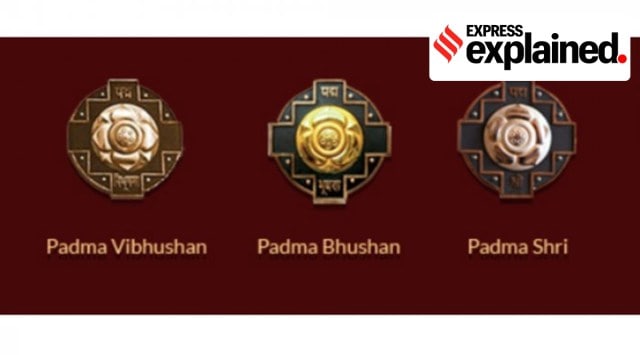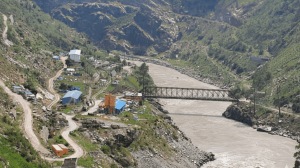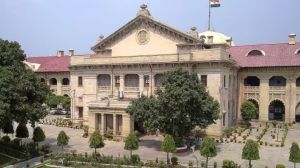Padma Awards 2023 announced: History of the awards, how the winners are chosen
Padma Awards 2023: How are India’s civilian honours awarded? What is the process? What do these awards entail? Can they be annulled?
 There are three levels of Padma Awards: Padma Vibhushan, Padma Bhushan and Padma Shri. (Photo: Padma Awards website)
There are three levels of Padma Awards: Padma Vibhushan, Padma Bhushan and Padma Shri. (Photo: Padma Awards website) On January 25, the government announced one Padma Vibhushan and 25 Padma Shri awards. The Padma Vibhushan will be awarded posthumously in the field of Medicine (Pediatrics) to Dilip Mahalanabis, who came up with ORS.
The Padma Awards are India’s highest civilian honours after the Bharat Ratna, seeking to “recognize achievements in all fields of activities or disciplines where an element of public service is involved,” the Padma Awards website said.
The history of Padma Awards
Two awards, the Bharat Ratna and Padma Vibhushan were first instituted in 1954 as India’s highest civilian honours. The latter had three classes: Pahela Varg (1st Class), Dusra Varg (Second Class) and Tisra Varg (Third Class). In 1955, these were subsequently named as Padma Vibhushan, Padma Bhushan and Padma Shri respectively.
While the Bharat Ratna is treated as an exceptional award with only 45 Bharat Ratnas being handed over till date, the Padma Awards are annually conferred to deserving civilians. Except for interruptions in 1978, 1979 and between 1993 and 1997, every year the names of the recipients are announced on Republic Day eve.
Typically, not more than 120 awards are given in a year, but this does not include posthumous awards or awards given to NRIs and foreigners. While the award is normally not conferred posthumously, the Government can consider posthumous felicitation in exceptional circumstances.
The first ever Padma Vibhushan awardees in 1954 were scientist Satyendra Nath Bose, artist Nandalal Bose, educationist and politician Zakir Hussain, social worker and politician Balasaheb Gangadhar Kher, and diplomat and academic V.K. Krishna Menon. The first ever non-Indian Padma Vibhushan awardee was Bhutanese king Jigme Dorji Wangchuk, who also received the award in 1954.
What the Padma Awards entail
The awards are presented by the President of India, typically at the Rashtrapati Bhavan.
The awardees do not get any cash reward but a certificate signed by the President apart from a medallion which they can wear at public and government functions. The awards are, however, not a conferment of title and the awardees are expected to not use them as prefix or suffix to their names.
While a Padma awardee can be given a higher award (i.e. a Padma Shri awardee can receive a Padma Bhushan or Vibhushan), this can only happen after five years of the conferment of the previous award.
The awards are given in certain select categories which include Art, Social Work, Public Affairs, Science & Engineering, Trade & Industry, Medicine, Literature & Education, Civil Service and Sports. Awards are also given for propagation of Indian culture, protection of human rights, wildlife protection among others.
The eligibility for Padma Awards
All persons without distinction of race, occupation, position or sex are eligible for these awards. However, government servants including those working with PSUs, except doctors and scientists, are not eligible for these awards.
The award seeks to recognise works of distinction and is given for distinguished and exceptional achievements or service in all fields of activities and disciplines.
According to Padma awards selection criteria, the award is given for “special services” and not just for “long service”. “It should not be merely excellence in a particular field, but the criteria has to be ‘excellence plus’.
The process of selection for Padma Awards
Any citizen of India can nominate a potential recipient. One can even nominate one’s own self. All nominations are to be done online where a form is to be filled along with details of the person or the organisation being nominated. An 800-word essay detailing the work done by the potential awardee is also to be submitted for the nomination to be considered.
The government opens the Padma awards portal for nominations between May 1 and September 15 every year. It also writes to various state governments, governors, Union territories, central ministries and various departments to send nominations.
There is also no rigid criteria or trenchant formula for selection, according to MHA. However, the lifetime achievement of an individual is among the main considerations.
All nominations received for Padma awards are placed before the Padma Awards Committee, which is constituted by the Prime Minister every year. The Padma Awards Committee is headed by the Cabinet Secretary and includes Home Secretary, Secretary to the President and four to six eminent persons as members. The recommendations of the committee are submitted to the Prime Minister and the President of India for approval.
Sources told The Indian Express in 2022 that once a preliminary selection is made, the antecedents of the selected awardees are verified using the services of central agencies to ensure nothing untoward has been reported or come on record about them. A final list is then prepared and announced.
Can the Padma Awards be refused?
While explicit consent is not sought from the awardee, before the final list is announced, they receive a call from the MHA. If they do not seek to receive the award, they can refuse at that time and their names will be removed without any noise. However, historically, there have been a few instances of more public refusals.
For instance, historian Romila Thapar refused to accept the Padma Bhushan twice, in 1992, and later again in 2005, stating that she would accept awards only “from academic institutions or those associated with my professional work.”
Former Kerala Chief Minister and doyen of India’s communist movement E.M.S. Namboodripad declined the award in 1992, as it went against his nature to accept a state honour.
Swami Ranganathananda declined the award in 2000 as it was conferred to him as an individual and not to the Ramakrishna Mission, his institution.
There have also been a few instances when the award has been “returned.” Recently, former Punjab Chief Minister Parkash Singh Badal returned his Padma Vibhushan in 2020, in the wake of the raging farmers’ protests in the state.
Annulment of Padma Awards
While extremely rare, the President of India can annul/cancel someone’s Padma award in case of any egregious misconduct committed by the recipient. Recently, this issue came up when medal-winning wrestler and Padma Shri awardee Sushil Kumar was implicated in a case of murder.
- 01
- 02
- 03
- 04
- 05






































